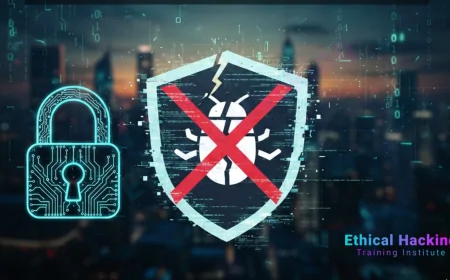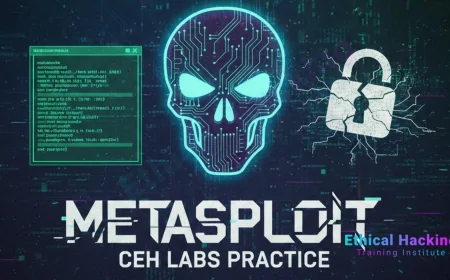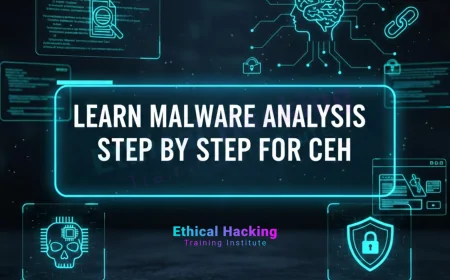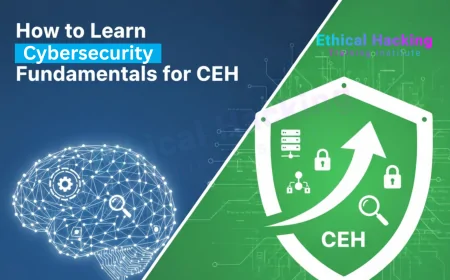What Certifications Come After OSCP? Best Cybersecurity Certifications to Advance Your Career
Discover the top cybersecurity certifications to pursue after OSCP. Learn how advanced credentials like OSCE, GPEN, CRTP, CISSP, and more can boost your skills and career growth.
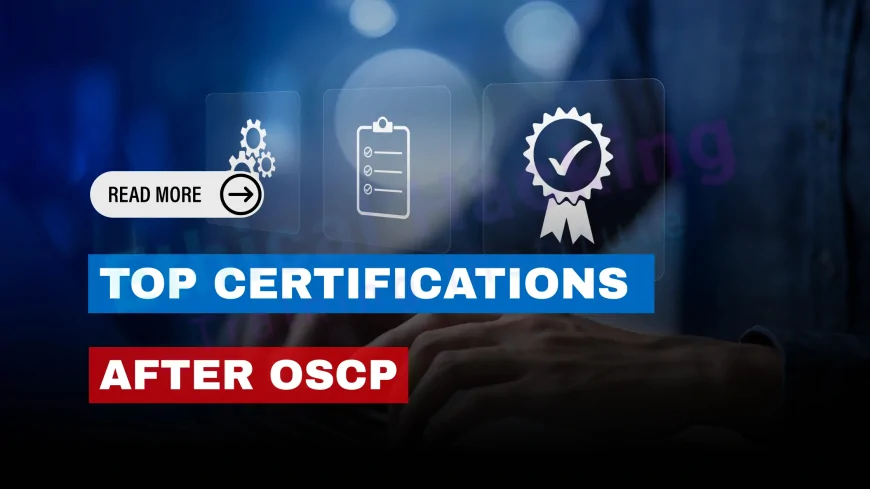
Table of Contents
- Why Pursue Certifications After OSCP?
- Top Certifications to Consider After OSCP
- How Ethical Hacking Training Institute Supports Your Post-OSCP Journey
- Tips for Choosing the Right Certification After OSCP
- Conclusion
- Frequently Asked Questions (FAQs)
The Offensive Security Certified Professional (OSCP) certification is widely regarded as one of the most prestigious and challenging credentials for penetration testers and ethical hackers. It validates practical skills in identifying and exploiting vulnerabilities under real-world conditions. But once you have earned the OSCP, what’s next? How do you continue advancing your cybersecurity career and deepen your expertise?
At the Ethical Hacking Training Institute, we often guide professionals on their journey beyond OSCP — helping them understand which certifications can elevate their skills, open doors to new roles, and boost earning potential. This blog explores the top certifications to pursue after OSCP and how they align with your career growth.
Why Pursue Certifications After OSCP?
Achieving OSCP proves you can hack ethically under pressure, but cybersecurity is a vast and ever-evolving field. Additional certifications can help you:
-
Specialize in advanced domains such as red teaming, incident response, or cloud security.
-
Validate new skills in defensive strategies, threat hunting, or forensics.
-
Increase your marketability for senior roles and leadership positions.
-
Stay updated with evolving technologies and compliance requirements.
-
Demonstrate commitment to lifelong learning and professional development.
Top Certifications to Consider After OSCP
1. Offensive Security Certified Expert (OSCE)
The OSCE is the logical next step within the Offensive Security track. It focuses on advanced penetration testing techniques, including exploit development and bypassing complex security controls.
-
Why OSCE? It builds on OSCP by challenging you with more complex scenarios.
-
Skills covered: Advanced exploit writing, evading antivirus, and sophisticated network attacks.
-
Ideal for: Penetration testers looking to become experts or technical consultants.
2. GIAC Penetration Tester (GPEN)
Offered by the Global Information Assurance Certification (GIAC), GPEN is a respected credential focusing on penetration testing methodologies and best practices.
-
Why GPEN? It balances hands-on skills with theory and expands knowledge of tools, techniques, and report writing.
-
Skills covered: Reconnaissance, exploitation, password attacks, and penetration test reporting.
-
Ideal for: Professionals wanting to validate comprehensive pentesting knowledge recognized globally.
3. Certified Red Team Professional (CRTP)
With cyber attacks becoming increasingly sophisticated, red teaming has gained prominence. The CRTP focuses on simulating realistic attack scenarios against enterprise networks, especially Windows environments.
-
Why CRTP? It’s highly practical and teaches stealthy adversary tactics.
-
Skills covered: Active Directory attacks, lateral movement, privilege escalation.
-
Ideal for: OSCP holders aiming to specialize in red team operations.
4. Certified Information Systems Security Professional (CISSP)
If you're aiming for leadership or managerial roles, CISSP by (ISC)² is an excellent choice. It covers a broad spectrum of cybersecurity domains beyond offensive tactics.
-
Why CISSP? It’s a gold standard for security management, governance, and architecture.
-
Skills covered: Security and risk management, asset security, security operations.
-
Ideal for: OSCP holders seeking roles in security management, architecture, or policy.
5. Certified Cloud Security Professional (CCSP)
With cloud adoption soaring, expertise in cloud security is highly valuable. CCSP equips professionals to secure cloud environments effectively.
-
Why CCSP? It addresses cloud-specific security challenges.
-
Skills covered: Cloud architecture, compliance, data security, risk management.
-
Ideal for: Pen testers expanding into cloud security or hybrid environments.
6. Offensive Security Web Expert (OSWE)
If web application security interests you, OSWE focuses on finding and exploiting web app vulnerabilities with practical, hands-on testing.
-
Why OSWE? It dives deep into web security beyond traditional pentesting.
-
Skills covered: Source code review, web exploitation, advanced web attacks.
-
Ideal for: OSCP professionals wanting to master web application hacking.
7. Certified Ethical Hacker (CEH)
Though sometimes considered more entry-level, CEH can still complement OSCP by covering a broad overview of ethical hacking concepts and tools.
-
Why CEH? It’s widely recognized and good for official compliance frameworks.
-
Skills covered: Scanning, enumeration, system hacking, social engineering.
-
Ideal for: Professionals aiming to refresh foundational knowledge or engage with compliance-driven roles.
How Ethical Hacking Training Institute Supports Your Post-OSCP Journey
At Ethical Hacking Training Institute, we understand the importance of continuous skill enhancement. Our advanced training modules and mentorship programs are designed to prepare you for these next-level certifications. With a focus on hands-on labs, real-world scenarios, and expert guidance, we help you sharpen your abilities beyond OSCP.
Whether you want to specialize in red teaming, exploit development, cloud security, or leadership roles, our curriculum aligns with the industry’s evolving demands and certification requirements.
Tips for Choosing the Right Certification After OSCP
-
Assess your career goals: Technical expert, red team specialist, security manager, or cloud security professional?
-
Evaluate your interests: Do you prefer deep technical skills or strategic, managerial knowledge?
-
Consider industry demand: Research job postings and growth areas in your region.
-
Look for hands-on training: Certifications with practical labs have higher employer value.
-
Check prerequisites and workload: Some certifications require significant study time and prerequisites.
Conclusion: Continuing Your Cybersecurity Excellence Journey
The OSCP certification is a remarkable achievement and a powerful foundation for a cybersecurity career. However, the journey doesn't stop there. Advancing your credentials through certifications like OSCE, GPEN, CRTP, CISSP, and others will not only deepen your expertise but also open new career paths and leadership opportunities.
By strategically selecting the next certifications that align with your goals and interests, you ensure you remain competitive and capable in the fast-changing world of cybersecurity.
At the Ethical Hacking Training Institute, we’re committed to guiding you every step of the way — from OSCP to advanced mastery and beyond. Explore our advanced training programs today and take your cybersecurity career to new heights.
FAQs:
What certifications are recommended after completing OSCP?
The Offensive Security Certified Expert (OSCE), GIAC Penetration Tester (GPEN), Certified Red Team Professional (CRTP), and Certified Information Systems Security Professional (CISSP) are popular certifications to pursue after OSCP.
Is OSCE harder than OSCP?
Yes, OSCE is considered more challenging as it covers advanced penetration testing techniques beyond OSCP’s scope.
Can I pursue cloud security certifications after OSCP?
Absolutely. Certifications like Certified Cloud Security Professional (CCSP) or AWS Certified Security – Specialty complement OSCP skills.
What is the difference between OSCP and OSWE?
OSCP covers general penetration testing, while OSWE (Offensive Security Web Expert) specializes in web application security.
Is GPEN certification valuable after OSCP?
Yes, GPEN offers in-depth knowledge of penetration testing methodologies and is globally recognized.
What is the Certified Red Team Professional (CRTP) certification?
CRTP focuses on Active Directory penetration testing and red team operations, ideal for offensive security professionals.
How does CISSP fit after OSCP?
CISSP is suited for those wanting to move into cybersecurity management or broaden their security knowledge beyond pen testing.
Do I need to finish OSCP before attempting OSCE?
Yes, OSCP is a prerequisite for OSCE certification.
Can ethical hackers without OSCP pursue GPEN?
Yes, but having OSCP first strengthens foundational skills beneficial for GPEN.
What skills does the OSCE certification emphasize?
OSCE emphasizes exploit development, advanced penetration testing, and bypassing modern defenses.
Is CRTP good for beginners?
CRTP is designed for professionals with some experience, especially those familiar with Windows environments.
How long does it take to prepare for OSCE after OSCP?
Preparation varies but typically ranges from 2 to 4 months, depending on prior experience.
Are there certifications focusing on web app security after OSCP?
Yes, OSWE is a specialized certification focusing solely on web application penetration testing.
Can OSCP holders benefit from Certified Ethical Hacker (CEH)?
CEH provides a broad overview useful for compliance and foundational knowledge, complementing OSCP’s hands-on skills.
Is there a certification for cloud penetration testing after OSCP?
Certifications like Offensive Security Certified Professional – Cloud (OSCP-Cloud) or Cloud Security certifications help specialize in this domain.
What job roles open after advanced certifications post-OSCP?
Senior Penetration Tester, Red Team Operator, Security Consultant, Cloud Security Architect, and Security Manager are common roles.
Does Ethical Hacking Training Institute offer courses for post-OSCP certifications?
Yes, the institute provides hands-on training and mentorship for advanced certifications like OSCE, GPEN, and CRTP.
How important is hands-on practice for certifications after OSCP?
Hands-on practice is critical; most advanced certifications include practical exams or labs to test real-world skills.
Are there online resources to prepare for post-OSCP certifications?
Yes, many platforms offer labs, practice tests, and courses specifically designed for OSCE, GPEN, and other advanced certs.
What is the salary impact of certifications after OSCP?
Advanced certifications typically lead to higher salary brackets and better job opportunities.
Can I pursue multiple certifications after OSCP simultaneously?
It’s possible but requires strong time management and focus due to the intensity of advanced certs.
Are there certifications focusing on scripting and automation after OSCP?
Certifications like Offensive Security Certified Expert (OSCE) and other specialized courses cover scripting for automation.
How does OSCP certification help with red teaming certifications?
OSCP builds foundational pen testing skills that are essential for advanced red teaming certifications like CRTP.
Can OSCP holders transition to cybersecurity management roles?
Yes, with certifications like CISSP and experience, OSCP holders can move into management and leadership roles.
Is there a certification path for blue team professionals after OSCP?
Yes, certifications like GIAC Certified Incident Handler (GCIH) and Certified Threat Intelligence Analyst (CTIA) are suitable.
What is the value of attending bootcamps for post-OSCP certifications?
Bootcamps provide intensive training, mentorship, and practical labs to accelerate certification preparation.
Are OSCP and OSCE certifications recognized globally?
Yes, both are internationally respected in the cybersecurity community.
How does Ethical Hacking Training Institute support certification exam readiness?
They offer practice labs, mock exams, personalized mentoring, and updated course material aligned with certification objectives.
Can post-OSCP certifications help in freelance cybersecurity jobs?
Yes, advanced certifications enhance credibility and can help land freelance or consulting projects.
Are certifications after OSCP focused only on offensive security?
No, while many are offensive-focused, others like CISSP and cloud security certs cover broader cybersecurity domains.
What's Your Reaction?
 Like
0
Like
0
 Dislike
0
Dislike
0
 Love
0
Love
0
 Funny
0
Funny
0
 Angry
0
Angry
0
 Sad
0
Sad
0
 Wow
0
Wow
0
